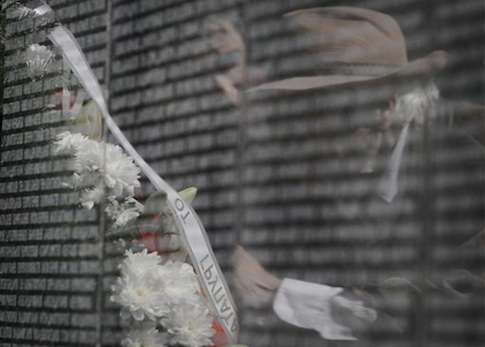The Victims of Communism Memorial Foundation will honor the millions of Europeans who suffered and died under the Nazi and Soviet Union regimes on Saturday, in remembrance of Black Ribbon Day.
August 23, 2014 marks the 75-year anniversary of a pact between Adolf Hitler and Joseph Stalin that ignited the Second World War, an agreement of non-aggression that allowed the fascist and communist regimes to divide up Europe.
The day now serves as a reminder of the dangers of totalitarianism, and an opportunity to educate the world about lesser-known details of what became the Molotov-Ribbentrop Pact.
"In the 1980s, in the U.S. and in Western Europe there were refugee communities from the captive nations of Europe, the Baltic countries, Poland, Czechoslovakia, others, who began to use August 23 as Black Ribbon Day as a day to protest the Soviet Union and to make the point to Americans and Westerners that the people living behind the Iron Curtain were living under totalitarian regimes," Marion Smith the executive director of the Victims of Communism Memorial Foundation, told the Washington Free Beacon in an interview.
"August 23 is significant and they chose that day because it is the anniversary of the Hitler-Stalin pact, which is usually called the Molotov-Ribbentrop Pact," he said. The pact included a secret protocol to divide Europe between Nazi Germany and the Soviet Union.
"The significant thing about the pact was that it meant Hitler could—once he took parts of Poland—he could turn west and invade Western Europe without having to fear that Stalin would attack him," Smith said. "Within just a few days of them signing this accord Hitler invaded Poland."
Smith argues that Stalin was "directly complicit" in the start of World War II.
"This is of course very different from the normal narrative that is printed in schools throughout the country about Stalin and about the Soviet Union and their role in World War II," he said. "Stalin is often viewed as an allied commander who helped defeat Hitler, when in fact Stalin was a war criminal before, during, and after World War II and because of this accord with Hitler, was directly responsible for helping to start World War II."
In May, the House of Representatives passed an amendment brought by Rep. John Shimkus (R., Ill.) that designating August 23 as Black Ribbon Day to honor victims under the Nazi and Soviet regimes. The legislation awaits action in the Senate.
Smith said it is a "no-brainer" for Congress to pass the resolution, and join the European Union, Canada, and numerous other countries that commemorate Black Ribbon Day. Smith and his organization are distributing copies of Lest We Forget: Memory of Totalitarianism in Europe, a book that highlights the stories of 30 people who experienced horrors under totalitarian regimes in Europe, to all members of Congress and their staff.
"We hope that this will help them understand why this is a commemorative day that the United States should acknowledge," Smith said.
The organization will hold a wreath-laying ceremony at 10 a.m. on Saturday at the Victims of Communism Memorial, located at the intersection of New Jersey Avenue and Massachusetts Avenue NW.
Smith said the event is an opportunity to remind people that communism, which is responsible for approximately 100 million dead in the last century, still lives on.
"You had here a Nazi regime and a communist Soviet regime cooperating, working together to bring death and destruction to Europe at the start of WWII," he said. "But then working together to commit large scale atrocities and genocide."
"There are instances where the Soviet’s secret police were rounding up German Jews who had escaped from Germany to the Soviet Union—they were rounding them up and giving them over to the SS," Smith said. "And this is just a story that is not often known."
"August 23 is the day that we hope in the future many more Americans and members of Congress will use the opportunity to commemorate the victims of totalitarianism in Europe," he added. "Of course it’s focused on Europe, but communism is an ideology that still governs people’s lives. It lives on in five existing communist states and in those five countries roughly 1.5 billion people, or 20 percent of the world’s population."
"Both ideologies are terrible, but one is largely gone and one lives on," Smith said.
